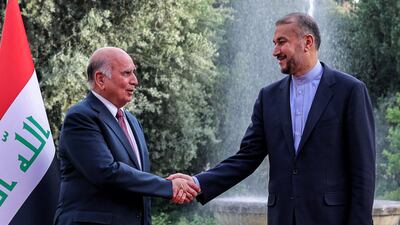Security concerns were the top priority for Iraqi Foreign Minister Fuad Hussein during a visit to Iran this week in the wake of Tehran’s recent attack on the northern Kurdish region.
Iran last month accused Iraq’s autonomous Kurdistan Regional Government of hosting an Israeli “strategic centre” and targeted a building in Erbil, the KRG’s capital, with a dozen ballistic missiles that wounded two civilians.
Mr Fuad's visit to Tehran this week sought to ease those tensions and prevent further escalation.
“The Iraqi foreign minister met various Iranian leaders and discussed the region’s political and security situations and ways to improve efforts in reducing tensions by giving priority to dialogue between states,” Iraq’s Foreign Ministry spokesman Ahmad Al Sahaf told The National.
“Iraq wants security and stability to prevail in the region,” he said.








Mr Hussein was accompanied by Iraq’s national security adviser, Qassem Al Araji, and several other officials, Mr Al Sahaf said.
The Iraqi foreign minister said Baghdad wants to “build bridges of trust between neighbouring countries, including Iran, in order to have an open dialogue to create security”, he said.
“Iraq’s stability is of importance to Iran.”
Iranian President Ebrahim Raisi met Mr Hussein and said that he will not allow Iraqi soil to be used for activities that disrupt his country’s security, his office said.
“The president emphasised that Iran strongly expects neighbouring countries, especially Iraq, not to allow any presence that is disruptive to the security of the Islamic Republic,” read a statement from Mr Raisi’s office.
It said Iran is closely “watching Israel's movement and will not allow it to endanger the security of the region”.
Mr Raisi accused Iraq’s Kurdistan region of “negligence”.
Mr Hussein assured Mr Raisi that Iraq will not be used as a base for attacks on Iran.
“We are ready for extensive co-operation, including in the field of security, to prevent any threat to the interests of Iran,” Mr Hussein said, according to the statement from Mr Raisi's office.
Baghdad lies on the fault line between Shiite Muslim majority Iran and the Sunni-ruled countries that are some of Tehran's regional rivals.
The Iraqi minister also met his Iranian counterpart Hossein Amirabdollahian and called for peaceful dialogue when resolving conflict.
"Our doors are open for dialogue and we hope Tehran will also be open to this as it is the only solution to resolving outstanding issues," Mr Hussein said during a press conference with Mr Amirabdollahian.
"It is clear that Iran has complaints about some security issues which we must talk about frankly so that they are resolved through diplomatic means,” he said on Wednesday.
The Iraqi minister said that dialogue was continuing between Iran and Saudi Arabia with the presence of international representatives.
"Baghdad's goal is to bring Iran and Saudi Arabia's visions closer together," he said.
Dialogue between the two states is expected to resume soon, the Iraqi minister said.
During the past year, Baghdad hosted several rounds of talks between officials from its two neighbours and mutual adversaries to defuse tensions.



